Traditional drinks keep you healthy in winter
In winter, people can easily catch a cold or other illness because cold weather makes our immune systems a bit weaker. To stay healthy and to protect the immune system, people traditionally prepared two special drinks: yuja hwachae, a fruit punch made from citron, and sujeonggwa, a cinnamon punch with dried persimmons. Thanks to their unique taste and smell, both drinks were particularly enjoyed in the royal court.
At court, yuja hwachae was eaten in particular to prevent catching cold, and the courtiers drank it cold. It’s made from thinly sliced pears and citrons, honey and water. The harmonized taste of the drink stimulates one’s appetite and helps digestion. The smell of citron and the sour taste of the pomegranate refreshes the inside of the mouth.
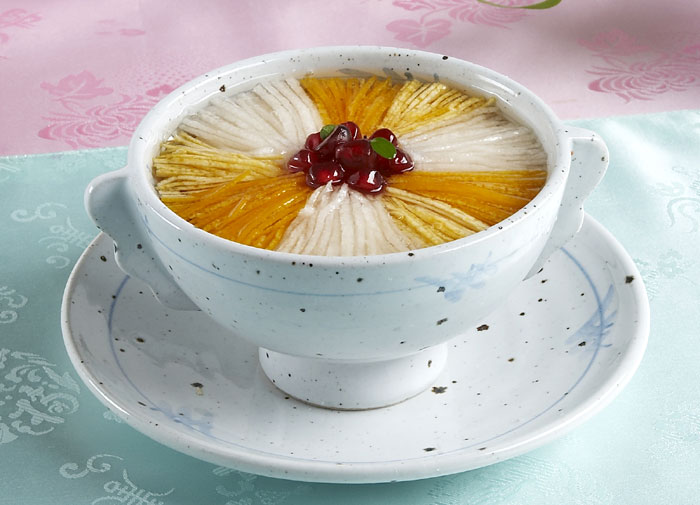
Yuja hwachae was a court drink consumed to prevent catching a cold. Decorated with thin slices of pear and citron,
and seeds from a pomegranate in the center, this drink also looks very beautiful.
Citrons are good when people have a fever due to a cold. A prescription using citron for coughs with a lot of phlegm can be found in the Bonchogangmok (본초강목, 本草綱目), a Chinese materia medica written during the Ming Dynasty. Citrons are high in vitamin C. One hundred grams of citron contain 150 milligrams of vitamin C, three times higher than lemons. It’s good to treat and prevent colds, neuralgia and strokes, too.
The sour taste of citron helps with liver functions, too. It’s good for colds that have body aches because it makes human muscles stronger. Citron contains hesperetin, which strengthens capillary vessels, which in turn helps prevent cerebral infarction caused by cerebrovascular diseases. The citric acid, which gives the citron its sour taste, helps produce digestive fluid and helps people to recover from fatigue.
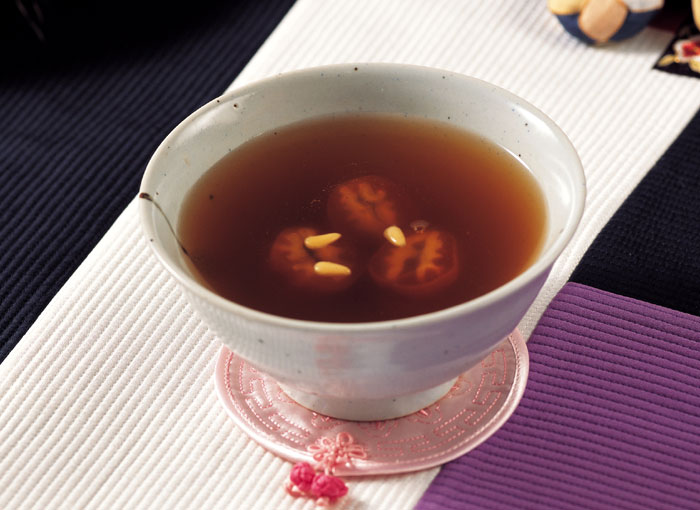
Sujeonggwa is a winter drink characterized for its unique smell and for the taste of ginger and cinnamon,
and for the sweet and soft dried persimmon.
Sujeonggwa means, “cookies in water.” It’s a cold drink. To prepare it, one needs to boil water with ginger and cinnamon, let it cool off and then add dried persimmons and pine nuts. This drink is good for coughs, sputum, and chronic bronchitis. It’s also good for hangovers, as it contains fruit sugar, vitamins and water, which helps to oxidize and release the alcohol accumulated inside the human body.
The main ingredients for sujeonggwa are ginger and cinnamon. These two ingredients are good at strengthening the stomach, preventing the catching of a cold, and also have bactericidal effects. Cinnamon, in particular, helps with the blood circulation, which reduces chest colds and stomach aches, and helps with digestion. Ginger is good at treating body chills, fevers, coughs and phlegm.
*** How to make Yuja hwachae
** Ingredients
1 Citron, 0.25 slices of pear
Honey water: 2 cups of water, 1 table spoon of honey, 4 table spoons of sugar
1 table spoon of pomegranate seeds, 1 table spoon of pine nuts.
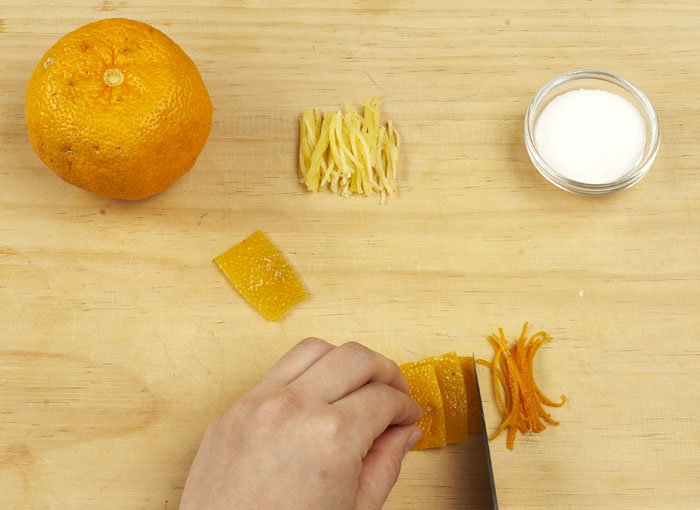
The citron skin is peeled, juiced and then thinly sliced.
** Preparation
1. Cut the citron into four pieces. Take out the flesh from the inside and squeeze it to make juice. Slice the outer skin thinly into 4-centimeter long, and 0.2-centimeter wide slices.
2. Peel the pear and slice it into 4-centimeter long, and 0.2-centimeter wide slices.
** Recipe
1. To make the honey water, boil the water, the honey and the sugar over a high heat for 3 minutes, and then let it cool.
2. Add the citron juice to the honey water to make a fruit punch.
3. Place the sliced citron peels and pears, by color, in a bowl.
4. Pour the juice into the bowl and decorate it with the pomegranate seeds and the pine nuts.
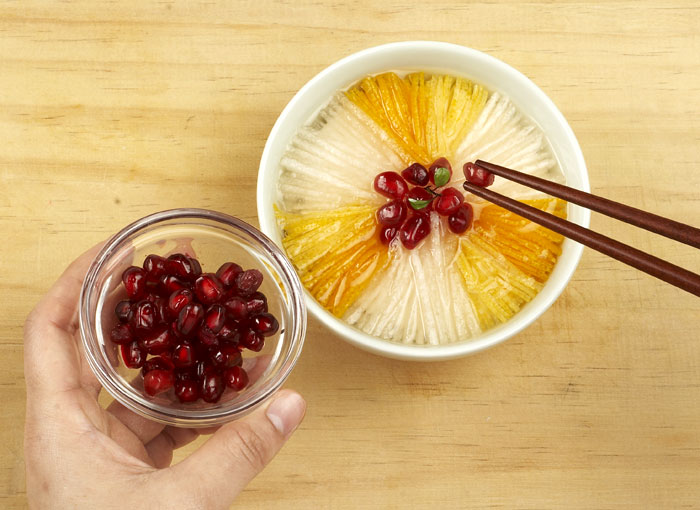 Carefully arrange the pomegranate seeds and pine nuts after putting combining the sliced pears
Carefully arrange the pomegranate seeds and pine nuts after putting combining the sliced pears
and citron skin with the juice.Yuja hwachae tastes better when the juice is cold.
*** How to make Sujeonggwa
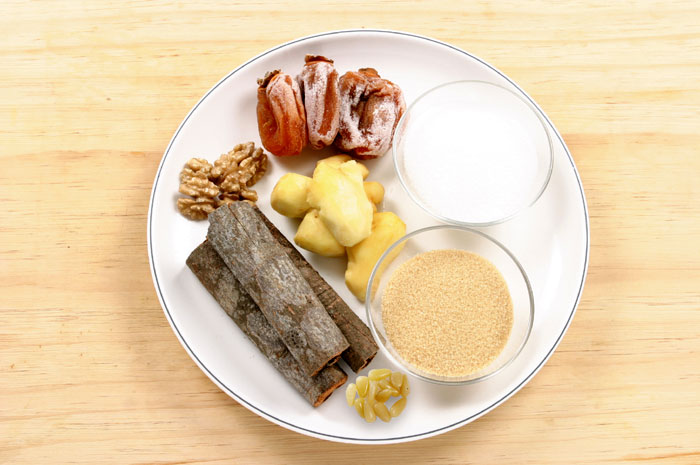
The ingredients for sujheonggwa include cinnamon, ginger, dried persimmons, brown sugar and pine nuts.
** Ingredients
200 grams ginger
2 kilograms (10 cups) water
120 grams un-spilt cinnamon
2 kilograms (10 cups) water
150 grams (1 cup) yellow sugar
213 grams (1.33 cups) sugar
200 grams (5) dried persimmons
50 grams (10) walnuts
5 grams pine nuts
** Preparation
1. Skin the ginger and cut it into 0.3-centimeter thick slices. Wash the un-spilt cinnamon and cut it in half if it’s too long.
2. Remove the stalks of dried persimmon. Slit one side with a knife and make it into a flat strip.
3. Soak the walnuts in warm water for 5 minutes.
4. Put the walnuts on the flat dried persimmons and roll them up. Cut them into 1-centimeter thick rolls.
5. Remove the tops of the pine nuts and wipe the nuts with a dry cotton cloth
** Recipe
1. Put the water and ginger in the pot. Heat it up for 9 minutes over a high heat. When it boils, reduce the heat to medium and boil it for 1 hour. Pour it through a sieve or a cotton cloth.
2. Put the water and the cinnamon in a pot. Heat it up for 9 minutes over high heat. When it boils, reduce the heat to medium and boil it for 1 hour. Strain it through a sieve or a cotton cloth.
3. Pour the ginger liquid and the cinnamon liquid into the pot and add the yellow sugar and regular sugar. Heat it up for 12 minutes over high heat. When it boils, reduce the heat to medium and boil it for another 10 minutes. Cool it down and top it with the persimmons and pine nuts.
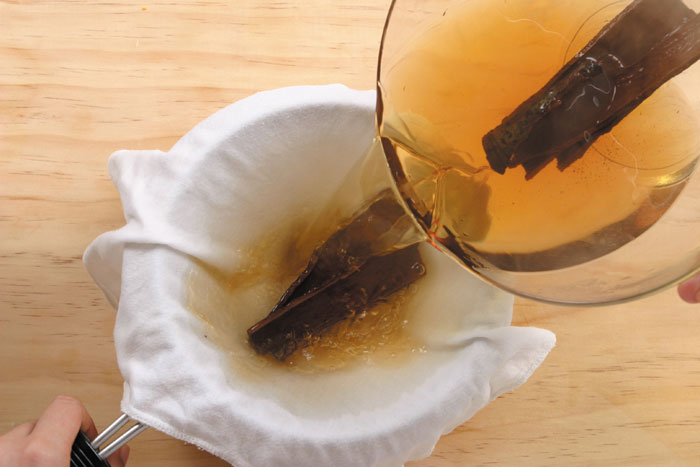
Pour the water and cinnamon in a pot. Heat it up for 9 minutes over high heat.
When it boils, reduce the heat to medium and boil it for 1 hour.
Pour it through a sieve or a cotton cloth. The ginger and cinnamon may be boiled together,
but boiling them separately will save each ingredient’s unique taste and smell.
Managed by Yoon Sojung
Korea.net Staff Writer
In cooperation with the Institute of Traditional Korean Food (ITKF)
Recipe from “The Beauty of Korean Food: 100 Best-Loved Recipes”
arete@korea.kr
